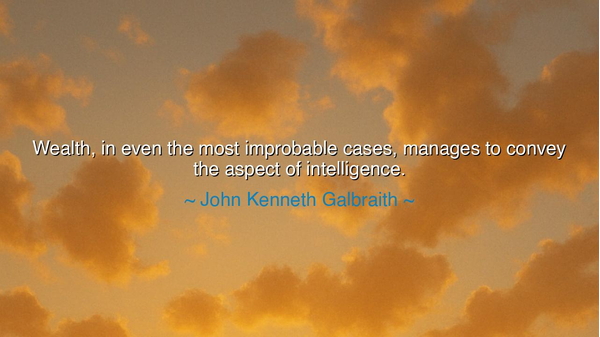
Wealth, in even the most improbable cases, manages to convey the
Wealth, in even the most improbable cases, manages to convey the aspect of intelligence.






The words of John Kenneth Galbraith, master economist and observer of human vanity, fall like a mirror before the soul of society: “Wealth, in even the most improbable cases, manages to convey the aspect of intelligence.” In this sentence, simple yet piercing, Galbraith unveils one of the oldest illusions of humankind — that riches are proof of wisdom, that success is a reflection of intellect. It is a truth spoken not to flatter, but to warn. For throughout history, men have mistaken fortune for virtue, and gold for genius. And in doing so, they have knelt before false gods.
To understand these words, we must look to the world as it is, not as we wish it to be. Wealth, when seen from afar, glitters with an almost divine authority. The prosperous man walks with confidence, speaks with certainty, and the crowd — ever hungry for leadership — confuses his confidence for intelligence. They assume that his riches are the fruit of profound thought, rather than the windfall of luck, inheritance, or opportunity denied to others. Galbraith, a thinker of the twentieth century, saw this illusion rising like smoke from the fires of modern capitalism — a world where appearance conquers substance, and the appearance of wisdom often outweighs wisdom itself.
Yet this is no new folly. The ancients, too, bowed to wealth as though it were a mark of divine favor. In the courts of Rome, the senators of greatest riches were thought to be the wisest; yet it was not the richest who saved the Republic, but the poor philosopher Cato, whose moral strength outweighed the gold of emperors. And in Athens, the wealthy Alcibiades dazzled with charm and ambition — but it was Socrates, humble and penniless, who saw truth most clearly. Thus, time and again, the glitter of wealth blinds the many to the dull light of ignorance that sometimes hides beneath it.
Still, Galbraith’s insight carries more than mockery — it carries understanding. He does not say that the wealthy are unintelligent, but that wealth conveys the aspect of intelligence. It creates the illusion. For success breeds followers, and followers feed the myth. A man who has gold finds his opinions valued, his mistakes forgiven, his ideas amplified by the echo of admiration. Even if his words are folly, the world listens — for the world equates success with wisdom. Thus, wealth magnifies a person’s presence, giving even mediocrity the air of genius. The irony is sharp: those who appear most certain are often least examined.
Let us look to the story of the great speculator of 1929, whose fortune soared with the stock market until the fateful crash. For a time, he was praised as a man of vision, a prophet of modern finance. His name was spoken with reverence by those who wished to imitate him. Yet when the markets fell, his brilliance vanished with his fortune, and the same crowds that once adored him called him fool. His intelligence had not changed — only his wealth. And with its disappearance, the illusion dissolved. Thus, Galbraith teaches that wealth does not reveal wisdom; it reveals perception — the way we see power and how easily we are deceived by its shine.
But his words also contain a challenge — for those who have wealth and for those who do not. To the rich, it is a warning against arrogance: remember that your fortune is not your mind, and that the applause of others may not be for your wisdom but for their envy. To the poor and striving, it is a reminder not to worship the golden mask of success. True intelligence, true virtue, lies not in what one possesses, but in what one perceives, understands, and creates with integrity. A wise man is rich in judgment, even if he owns nothing; a fool may command empires, and still be poor in spirit.
So let this be the lesson passed to those who seek to see clearly: measure not a man by his gold, but by his grasp of truth. Wealth may disguise ignorance, but time unmasks all illusions. Seek to cultivate the kind of intelligence that endures poverty and prosperity alike — the intelligence of character, of humility, of insight. For the applause of the world fades with fortune, but wisdom endures when all riches turn to dust. As Galbraith teaches, do not mistake the shimmer of wealth for the light of intelligence — one reflects the sun, the other creates it. Choose, then, to shine from within.






AAdministratorAdministrator
Welcome, honored guests. Please leave a comment, we will respond soon